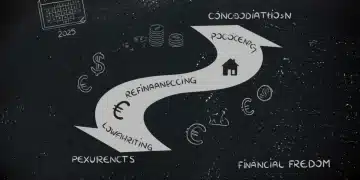Student Loan Deferment vs. Forbearance: Which Option Is Best?

Student loan deferment and forbearance are two options that allow you to temporarily postpone or reduce your federal student loan payments, but they differ in eligibility requirements, interest accrual, and potential impact on your loan balance.
Navigating student loan repayment can be overwhelming, especially when facing financial hardship. Understanding the differences between student loan deferment vs. forbearance: understand the differences and choose the best option can provide crucial relief and prevent your loans from going into default.
What is Student Loan Deferment?
Student loan deferment is a temporary postponement of your student loan payments. During deferment, you may not be required to make any payments, depending on the type of loan and the deferment reason.
Deferment is typically available for borrowers who meet certain eligibility requirements, such as:
Eligibility for Deferment
- Economic Hardship: If you are experiencing financial difficulties, such as unemployment or low income.
- In-School Deferment: If you are enrolled at least half-time in an eligible school.
- Military Service: If you are serving on active duty in the military.
It’s important to note that while your payments are deferred, interest may continue to accrue on your loans, depending on the type of loan you have.

Deferment can provide much-needed breathing room during challenging times, allowing borrowers to focus on getting back on their feet financially without the immediate pressure of loan payments. Understanding the specific eligibility requirements for deferment is key to determining if it’s the right option for your situation.
What is Student Loan Forbearance?
Student loan forbearance is another option for temporarily postponing or reducing your student loan payments. Unlike deferment, forbearance is generally granted at the discretion of your loan servicer.
Forbearance is available for borrowers who are experiencing financial difficulties but may not meet the specific eligibility requirements for deferment. Common reasons for forbearance include:
Common Reasons for Forbearance
- Financial Hardship: Temporary financial setbacks, such as medical expenses or job loss.
- Medical Expenses: Significant medical bills that make it difficult to afford loan payments.
- Change in Employment: A reduction in income due to a job change or temporary unemployment.
During forbearance, interest continues to accrue on your loans, and you are responsible for paying that interest when the forbearance period ends. This can lead to an increase in your overall loan balance.
Forbearance offers a safety net for borrowers facing unforeseen financial obstacles. However, the accrual of interest during the forbearance period means that it’s important to carefully consider the long-term financial implications before choosing this option.
Deferment vs. Forbearance: Key Differences
While both deferment and forbearance offer temporary relief from student loan payments, there are several key differences to consider:
Understanding these differences is crucial for making an informed decision about which option is best for your individual circumstances.
Eligibility
- Deferment: Typically requires meeting specific eligibility criteria, such as economic hardship, in-school enrollment, or military service.
- Forbearance: Generally granted at the discretion of the loan servicer for borrowers experiencing financial difficulties.
Interest Accrual
- Deferment: Interest may or may not accrue, depending on the type of loan. For subsidized loans, the government pays the interest during deferment.
- Forbearance: Interest always accrues on all types of loans during forbearance.
Impact on Loan Balance
- Deferment: May not increase the loan balance for subsidized loans.
- Forbearance: Always increases the loan balance due to accrued interest.
Choosing between deferment and forbearance requires a careful evaluation of your eligibility, financial situation, and long-term repayment goals. While deferment may be more beneficial due to potential interest subsidies, forbearance can provide relief when deferment options are limited.
Pros and Cons of Deferment
Deferment comes with its own set of advantages and disadvantages. Weighing these factors can help you determine if it’s the right choice for you.
Evaluating these pros and cons in the context of your own financial situation can help you make an informed decision about whether deferment is the right path forward.
Pros of Deferment
One of the biggest advantages of deferment is that if you have subsidized loans, the government pays the interest that accrues during the deferment period. This means your loan balance won’t increase while you’re not making payments.
Additionally, deferment can provide a longer period of payment suspension compared to forbearance.
Cons of Deferment
However, not all loans are eligible for deferment. Eligibility is often tied to specific circumstances, such as economic hardship or continued education.

For unsubsidized loans, interest continues to accrue during deferment, which can increase your loan balance over time.
Pros and Cons of Forbearance
Forbearance also has its own pros and cons. Understanding these can help you assess whether it’s the best option for your needs.
Ultimately, the decision to pursue forbearance should be made after considering its short-term benefits against its long-term financial implications.
Pros of Forbearance
Forbearance is generally easier to obtain than deferment, as it doesn’t require meeting strict eligibility criteria. It can be a good option for borrowers who don’t qualify for deferment but are still experiencing financial difficulties.
It provides immediate relief from student loan payments, allowing borrowers to address urgent financial needs.
Cons of Forbearance
The biggest drawback of forbearance is that interest always accrues on all types of loans during the forbearance period. This accrued interest is added to your loan balance, increasing the total amount you owe.
Additionally, forbearance can lead to a longer repayment period and higher overall costs due to the increased loan balance.
Making the Right Choice for Your Student Loans
Deciding between deferment and forbearance requires careful consideration of your individual circumstances and financial goals. Here are some steps to help you make the right choice:
By taking a proactive and informed approach, you can choose the option that best protects your financial well-being while ensuring responsible student loan management.
- Assess Your Eligibility: Determine if you meet the eligibility requirements for deferment. If you do, it may be the more beneficial option.
- Evaluate Your Financial Situation: Consider the severity and duration of your financial difficulties. Forbearance may be a better option for short-term setbacks.
- Contact Your Loan Servicer: Discuss your options with your loan servicer. They can provide personalized guidance and help you understand the implications of each choice.
| Key Aspect | Brief Description |
|---|---|
| 🔑 Eligibility | Deferment has specific criteria; forbearance is more discretionary. |
| 💰 Interest | Deferment may not accrue interest (subsidized loans); forbearance always does. |
| 📈 Loan Balance | Deferment may not increase balance; forbearance always increases it. |
| ⏱️ Timeframe | Deferment can sometimes offer a longer period of payment suspension. |
Frequently Asked Questions (FAQ)
▼
If you can’t afford your student loan payments, contact your loan servicer immediately. They can help you explore options like deferment, forbearance, or income-driven repayment plans to find a manageable solution.
▼
To apply for student loan deferment or forbearance, you’ll need to contact your loan servicer. They will provide you with the necessary application forms and instructions on how to submit them for review and approval.
▼
Deferment and forbearance themselves don’t directly impact your credit score. However, if you fail to make payments after the deferment or forbearance period ends, it can negatively affect your credit history.
▼
The availability and terms of deferment or forbearance for private student loans depend on the lender’s policies. Contact your private loan servicer to inquire about your options and eligibility requirements.
▼
With subsidized loans, the government pays the interest that accrues during deferment, so your loan balance doesn’t increase. For unsubsidized loans, interest continues to accrue during deferment, adding to your overall loan balance.
Conclusion
In conclusion, understanding the nuances of student loan deferment vs. forbearance: understand the differences and choose the best option is essential for managing your student loan repayment effectively, especially during financial challenges. By carefully considering your eligibility, financial situation, and the long-term implications of each option, you can make an informed decision that provides the relief you need while minimizing the impact on your overall loan balance.





